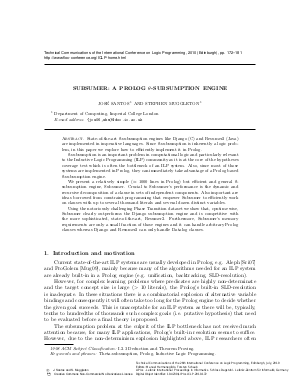Subsumer: A Prolog theta-subsumption engine
Authors Jose Santos, Stephen Muggleton
-
Part of:
Volume:
Technical Communications of the 26th International Conference on Logic Programming (ICLP 2010)
Part of: Series: Leibniz International Proceedings in Informatics (LIPIcs)
Part of: Conference: International Conference on Logic Programming (ICLP) - License:
 Creative Commons Attribution-NonCommercial-NoDerivs 3.0 Unported license
Creative Commons Attribution-NonCommercial-NoDerivs 3.0 Unported license
- Publication Date: 2010-06-25
File

PDF
LIPIcs.ICLP.2010.172.pdf
- Filesize: 310 kB
- 10 pages
Document Identifiers
Subject Classification
Keywords
- Theta-subsumption
- Prolog
- Inductive Logic Programming
Metrics
- Access Statistics
-
Total Accesses (updated on a weekly basis)
0PDF Downloads0Metadata Views
Abstract
State-of-the-art theta-subsumption engines like Django (C) and Resumer2 (Java) are implemented in imperative languages. Since theta-subsumption is inherently a logic problem, in this paper we explore how to efficiently implement it in Prolog. theta-subsumption is an important problem in computational logic and particularly relevant to the Inductive Logic Programming (ILP) community as it is at the core of the hypotheses coverage test which is often the bottleneck of an ILP system. Also, since most of those systems are implemented in Prolog, they can immediately take advantage of a Prolog based theta-subsumption engine. We present a relatively simple (~1000 lines in Prolog) but efficient and general theta-subsumption engine, Subsumer. Crucial to Subsumer's performance is the dynamic and recursive decomposition of a clause in sets of independent components. Also important are ideas borrowed from constraint programming that empower Subsumer to efficiently work on clauses with up to several thousand literals and several dozen distinct variables. Using the notoriously challenging Phase Transition dataset we show that, cputime wise, Subsumer clearly outperforms the Django subsumption engine and is competitive with the more sophisticated, state-of-the-art, Resumer2. Furthermore, Subsumer's memory requirements are only a small fraction of those engines and it can handle arbitrary Prolog clauses whereas Django and Resumer2 can only handle Datalog clauses.
Cite As Get BibTex
Jose Santos and Stephen Muggleton. Subsumer: A Prolog theta-subsumption engine. In Technical Communications of the 26th International Conference on Logic Programming. Leibniz International Proceedings in Informatics (LIPIcs), Volume 7, pp. 172-181, Schloss Dagstuhl – Leibniz-Zentrum für Informatik (2010)
https://doi.org/10.4230/LIPIcs.ICLP.2010.172
BibTex
@InProceedings{santos_et_al:LIPIcs.ICLP.2010.172,
author = {Santos, Jose and Muggleton, Stephen},
title = {{Subsumer: A Prolog theta-subsumption engine}},
booktitle = {Technical Communications of the 26th International Conference on Logic Programming},
pages = {172--181},
series = {Leibniz International Proceedings in Informatics (LIPIcs)},
ISBN = {978-3-939897-17-0},
ISSN = {1868-8969},
year = {2010},
volume = {7},
editor = {Hermenegildo, Manuel and Schaub, Torsten},
publisher = {Schloss Dagstuhl -- Leibniz-Zentrum f{\"u}r Informatik},
address = {Dagstuhl, Germany},
URL = {https://drops.dagstuhl.de/entities/document/10.4230/LIPIcs.ICLP.2010.172},
URN = {urn:nbn:de:0030-drops-25959},
doi = {10.4230/LIPIcs.ICLP.2010.172},
annote = {Keywords: Theta-subsumption, Prolog, Inductive Logic Programming}
}
